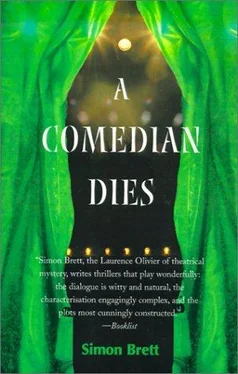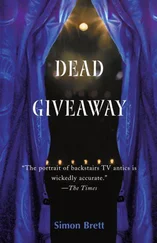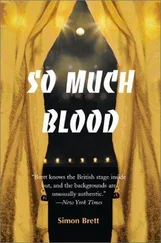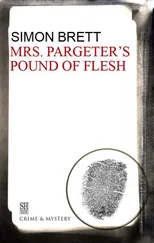Simon Brett - A Comedian Dies
Здесь есть возможность читать онлайн «Simon Brett - A Comedian Dies» весь текст электронной книги совершенно бесплатно (целиком полную версию без сокращений). В некоторых случаях можно слушать аудио, скачать через торрент в формате fb2 и присутствует краткое содержание. Жанр: Классический детектив, на английском языке. Описание произведения, (предисловие) а так же отзывы посетителей доступны на портале библиотеки ЛибКат.
- Название:A Comedian Dies
- Автор:
- Жанр:
- Год:неизвестен
- ISBN:нет данных
- Рейтинг книги:5 / 5. Голосов: 1
-
Избранное:Добавить в избранное
- Отзывы:
-
Ваша оценка:
- 100
- 1
- 2
- 3
- 4
- 5
A Comedian Dies: краткое содержание, описание и аннотация
Предлагаем к чтению аннотацию, описание, краткое содержание или предисловие (зависит от того, что написал сам автор книги «A Comedian Dies»). Если вы не нашли необходимую информацию о книге — напишите в комментариях, мы постараемся отыскать её.
A Comedian Dies — читать онлайн бесплатно полную книгу (весь текст) целиком
Ниже представлен текст книги, разбитый по страницам. Система сохранения места последней прочитанной страницы, позволяет с удобством читать онлайн бесплатно книгу «A Comedian Dies», без необходимости каждый раз заново искать на чём Вы остановились. Поставьте закладку, и сможете в любой момент перейти на страницу, на которой закончили чтение.
Интервал:
Закладка:
Charles found it difficult to get involved in the scene, and the time passed very slowly.
Then he caught sight of something on one of the monitors. It was a shot from a camera which was focused nowhere in particular, just framing the edge of the set. Behind this two figures were visible. Lennie Barber and Chox Morton.
There was no microphone boom near them, so, though Charles fiddled with the speaker controls in the little observation room, he could not hear what was being said.
But the mime was expressive enough. Lennie Barber was definitely telling Chox to go away. Chox seemed doubtful at first, then resigned, and the two parted.
Which was hopeful. If Chox believed Lennie’s story about Charles having left the building, then the pressure was off for a little while at least. If only he could have actually heard what was being said between the two, Charles could have relaxed.
He was soon let off the hook. The door from the studio to the control room opened and Lennie Barber entered, followed by Walter Proud. The comedian came straight through to where Charles was sitting and whispered, ‘It’s all right. He’s gone.’
‘Thanks very much. Bless you, Lennie.’
Walter Proud bustled into the observation room, all jovial importance. ‘Charles, Lennie and I were going to have a bite to eat, talk through a few things. Going to Dollops, you know, that little bistro round the corner. You care to join us?’
‘That’s very kind of you, Walter. I might. Yes, why not? Got to get out of my Wilkie Pole gear, so I should think I’d be along in about half an hour.’
‘Fine. See you then.’
The producer and the comedian left. It was nine-thirty and the end of the studio session. The plugs were pulled out and everyone started to leave (straight to the bar). What hadn’t been done would have to wait for the next, already over-crowded, day.
Charles stretched out for a few minutes, letting the tension drain from his limbs. The problem of an avenging Chox remained, but at least he had earned a brief reprieve. After five minutes, he felt almost human and started out for his dressing room.
It was when he got into the corridor that Charles saw Chox. The roadie was visible through the glass doors at the end. He looked jumpy and nervous, waiting.
A moment of panic stopped his mind dead. Then he started to think quickly. The corridor was a dead end, leading only to the Ladies’ and Gents’ lavatories. The only escape for him was back through the control room into the studio.
But even as he realized this, it was too late. In the shock of seeing Chox, he had moved back and was now nearer the lavatories than the control room. Just as he was about to step forward, the roadie turned suddenly towards him and pushed open the door into the corridor.
Instinctively, Charles leaped backwards and shoved his way into the Gents. As he did it, he saw his folly. He was trapped in a cul-de-sac.
He went to one of the cubicles and locked himself in. It would give him a little protection. If necessary, he supposed he could stay in there all night. And in the state he was in, the lavatory could be very useful.
He heard the click of the outer door as someone entered. Then silence. He waited for Chox to speak, or for a blow on the door, or for the appearance of that thin cruel face over the top of the cubicle.
There was nothing.
Then, again, the click of the outer door being opened. This was followed sharply by the sound of another cubicle door being shut and locked. Presumably Chox had hidden himself from a potential witness.
The unseen newcomer seemed to take an unconscionably long time relieving himself, but eventually there was the swish of water in the washbasin and the clank of the roller towel being pulled down. Followed by the soft thud of the outer door closing.
Once again Charles and Chox were the only people in the room. Playing a waiting game.
The silence was oppressive. Every hum of the air conditioning, every gurgle of the cisterns took on a new and menacing identity. But there was no human sound.
Time crawled by, broken-backed. Charles was sweating a lot. The more he thought about it, the less he liked the idea of waiting till someone else came in. Now the studio work had stopped, the building would be empty but for the security men and the crowd in the bar, many floors above. He looked at his watch. Quarter to eleven. The bar-flies would soon be making their meandering ways home to disgruntled wives, to disappointed second wives or with unsuitable PAs.
He couldn’t face the idea of sitting there for another ten hours. Better confront whatever evil there was outside than let his imagination inflate it to terror proportions.
He swallowed deeply, then, in one movement, slid back the bolt, opened the door and stepped outside.
No one.
The row of blue doors was uniform, all closed. He moved softly along, tense for attack, pushing against each door.
Each one gave inward to his pressure. Each cubicle was empty.
Until he came to the one nearest the entrance. That was locked on the inside.
Plucking up courage, he knocked on the door.
Nothing.
He called Chox’s name.
There was no response.
He drew back and crouched to look under the door. He could see the end of a thin leg protruding from discoloured jeans. The foot was encased in a frayed grey plimsoll. He recognized Chox’s clothes.
Still, fearing a trap, he found a lavatory brush and poked at the leg underneath the door. There was no movement.
He rang the security men from the studio control room. Two of them came. One climbed over the top of the cubicle and opened the door. He came out and the three of them looked inside.
Chox Morton was sitting on the closed lavatory seat, leaning back against the pipes. His eyes were closed and his sleeve rolled up to show the pitted terrain of his forearm. The other arm hung loose by his side and on the tiled floor, where it had dropped from his hand, lay a plastic syringe.
He was not breathing.
CHAPTER FIFTEEN
COMIC: I say, I say, I say, do you know why my girl-friend’s called ‘Television’?
FEED: No, I don’t know why your girl-friend’s called ‘Television’.
COMIC: Because she never has much on on Saturday nights and she often does repeat performances on Sundays.
Charles had to spend a long time at the police station. There seemed to be no suspicion of foul play in Chox Morton’s death, but the police were interested in what Charles had been doing hanging around the television premises in makeup and costume so long after the studio session had finished.
Since he didn’t have enough evidence to start propounding his theory of Bill Peaky’s murder, he had to make do with some rather incomplete excuses to justify his presence. He sweated for a bit while the police questioned him, but after a time they realized that, however suspicious his behaviour, he hadn’t actually committed any crime. Having nothing to charge him with, they spoke to him sternly, took a statement about his discovery of Chox’s body and let him go. They warned him that he might have to appear at the inquest and said they would be in touch to fix the details if necessary.
As, with some relief, he left the interview room, Charles saw a middle-aged man in a discreet tweed suit sitting waiting on a chair in the corridor. He was about to walk past, but the man addressed him.
‘Excuse me. I gather you are the one who found the body.’
‘Yes.’
‘Ah.’ There was a pause. The man looked distressed, like the man from the ad with no life insurance at fifty-five. He seemed to want to talk, but had nothing to say. When he introduced himself, it was clear why he needed to communicate with someone. ‘I’m Charles’ father.’
Читать дальшеИнтервал:
Закладка:
Похожие книги на «A Comedian Dies»
Представляем Вашему вниманию похожие книги на «A Comedian Dies» списком для выбора. Мы отобрали схожую по названию и смыслу литературу в надежде предоставить читателям больше вариантов отыскать новые, интересные, ещё непрочитанные произведения.
Обсуждение, отзывы о книге «A Comedian Dies» и просто собственные мнения читателей. Оставьте ваши комментарии, напишите, что Вы думаете о произведении, его смысле или главных героях. Укажите что конкретно понравилось, а что нет, и почему Вы так считаете.












